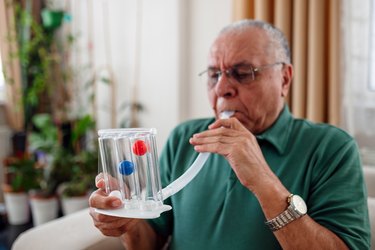
Medical terms can be misleading sometimes. Take COPD for example: While it might sound like a single condition from the name — which stands for chronic obstructive pulmonary disease — it actually represents a group of lung diseases.
COPD includes emphysema, chronic bronchitis and chronic asthma, Glenn VanOtteren, MD, chief of the Division of Pulmonary, Critical Care & Sleep Medicine for Spectrum Health, tells LIVESTRONG.com.
Video of the Day
Video of the Day
More than 16 million Americans have been diagnosed with some form of COPD, according to the Centers for Disease Control and Prevention (CDC), but because not everyone seeks help or even recognizes their symptoms, the actual number of people with COPD is thought to be much higher.
Symptoms of COPD
COPD affects how you breathe. As the CDC explains, COPD symptoms include:
- Shortness of breath
- Difficulty breathing
- Trouble taking a deep breath
- Wheezing
- Coughing
- Excess phlegm and mucus
Fatigue is another symptom in severe cases of COPD, because your body is working so hard to breathe.
Typically, people with this lung disease will have flare-ups, which are often triggered by infections or exposure to an irritant like pollution or smoke.
Unfortunately, as COPD progresses, Dr. VanOtteren explains that it can lead to progressive disability, and ultimately respiratory failure, which can lead to death. Life expectancy with COPD depends on how severe the condition is and how well the person manages it.
One older but often-cited study in the International Journal of Chronic Obstructive Pulmonary Disease from April 2009 found that people with COPD have a shorter life expectancy than those without the condition, but quitting smoking can help close the gap.
According to the CDC, detecting COPD early can also help, so being aware of your risks and the symptoms of the condition are important.
Causes of COPD
COPD is not contagious. The main cause of COPD is smoking. According to Dr. VanOtteren, long-term exposure to tobacco smoke is the key factor here. That includes, of course, smoking yourself, or being exposed to secondhand smoke. The longer you have smoked, the higher your risk.
Essentially, over time, smoke damages the lungs, leading to emphysema (when the air sacs in the lungs are damaged) and chronic bronchitis (when the tubes that carry air to and from the lungs are inflamed).
Other things that may play a role include:
- Exposure to air pollution
- Workplace hazards, including certain dusts and fumes
- Lung infections
- Genetics
Who Gets COPD?

Current smokers or people who used to smoke are at high risk of COPD. Beyond that, the CDC lists these common characteristics among people with the condition:
- More people assigned female at birth are living with COPD than those assigned male at birth
- People ages 65 and older
- American Indians, Alaskan Natives and multiracial non-Hispanics
- People who are unemployed, retired or can't work
- Those with less than a high school education
- Divorced, widowed and separated people
How Is COPD Diagnosed?
COPD is diagnosed with a doctor's evaluation that includes a review of symptoms and a detailed physical examination, as well as chest imaging and lung function testing. For example, a spirometry test can be used to test your lung function — a spirometer is a simple device that you inhale and exhale into to test your lung capacity.
Another test often done to diagnose COPD is the six-minute test, which evaluates how far you're able to walk in that timeframe. Although the test is very simple and straightforward, it can actually tell your doctor a lot about how your body (and your lungs, specifically) responds to exertion. The test can also be used to see how well COPD treatment is working.
What Are the 4 Stages of COPD?
There are four stages of COPD, according to the Global Initiative for Chronic Obstructive Lung Disease (GOLD):
- Stage I: Mild
- Stage II: Moderate
- Stage III: Severe
- Stage IV: Very Severe
These are diagnosed based on a spirometry test.
COPD Treatments
There is no cure for COPD, but the condition can be managed and treated. Dr. VanOtteren says some of the most common treatments for COPD include the following:
1. Pulmonary Rehabilitation
Pulmonary rehabilitation is exactly what it sounds like — rehab to strengthen lungs. Just like physical therapy, pulmonary rehab is an exercise program that focuses on strengthening your lungs and the muscles that support them. This might include walking, yoga and breathing exercises.
According to the American Lung Association, it's usually done in an outpatient setting and can sometimes be done in your own home.
2. Medication
One of the most common types of medication for COPD are bronchodilation medications, which help open the airways. These are typically given as inhalers.
Other medication may include antibiotics, because treating infections early on is important for managing COPD. The CDC explains that an infection in the lungs or respiratory tract can cause even more difficulty breathing and worsen the condition.
3. Oxygen Therapy
For people with severe COPD and low oxygen levels, oxygen therapy may be used. However, oxygen therapy has to be carefully given in cases of severe COPD, so it should only be used under a doctor's guidance.
4. Lifestyle Changes
Overall, lifestyle changes can play a major role in managing COPD. Dr. VanOtteren notes that some of the most important things you can do to manage COPD are:
- Stop smoking and vaping
- Avoid being around tobacco smoke
- Steer clear of air pollution as much as possible
Additionally, he advises that you stay up-to-date with vaccines, like the annual flu shot, which can help you avoid getting sick and making your COPD symptoms worse.
"It's a good idea for everyone to get their recommended vaccinations," he says. "This can be particularly helpful for those who suffer from COPD."
What About Natural Remedies?
Apple cider vinegar is sometimes touted as a natural remedy that can help clear the lungs and help in conditions like COPD. And while Dr. VanOtteren notes that apple cider vinegar is thought to have antioxidant properties, which are "theoretically helpful" in protecting the lungs from injury, unfortunately, no scientific evidence has proven that apple cider vinegar is effective as a treatment for COPD.
There is some evidence that getting more vitamin C and vitamin E in your diet may help, though. An October 2015 study in the International Journal of Chronic Obstructive Pulmonary Disease found that a diet richer in these antioxidants lowered the risk of COPD and increased lung function, particularly in people assigned male at birth.
Related Reading
- Centers for Disease Control and Prevention: "Chronic Obstructive Pulmonary Disease (COPD)"
- American Lung Disease: "The Basics of Pulmonary Rehabilitation"
- Centers for Disease Control and Prevention: "Basics of COPD"
- International Journal of Chronic Obstructive Pulmonary Disease: “The Effect of Dietary Antioxidant on the COPD Risk: The Community-ased KoGES (Ansan–Anseong) Cohort”
- Mayo Clinic: "Emphysema"
- Mayo Clinic: "Bronchitis"
- Health and Safety Executive: "COPD Causes: Occupations and Substances"
- International Journal of Chronic Obstructive Pulmonary Disease: "Life expectancy and years of life lost in chronic obstructive pulmonary disease: Findings from the NHANES III Follow-up Study"
- Global Initiative for Chronic Obstructive Lung Disease: "Global Strategy for the Diagnosis, Management, and Prevention of Chronic Obstructive Pulmonary Disease"
Is this an emergency? If you are experiencing serious medical symptoms, please see the National Library of Medicine’s list of signs you need emergency medical attention or call 911.